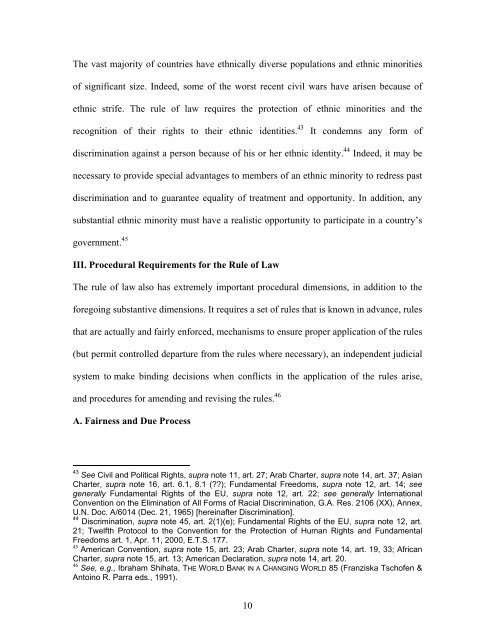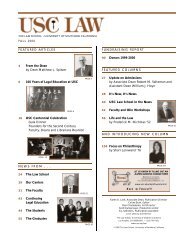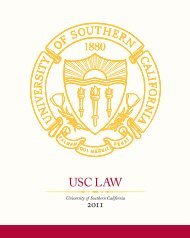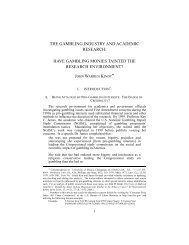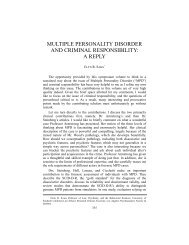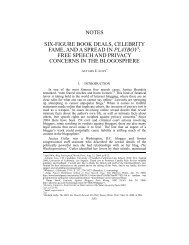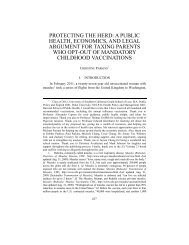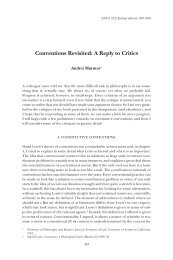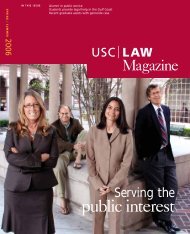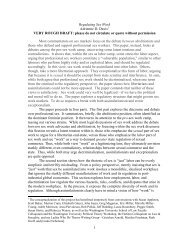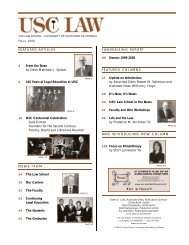Bufford Defining the Rule of Law
Bufford Defining the Rule of Law
Bufford Defining the Rule of Law
Create successful ePaper yourself
Turn your PDF publications into a flip-book with our unique Google optimized e-Paper software.
The vast majority <strong>of</strong> countries have ethnically diverse populations and ethnic minorities<br />
<strong>of</strong> significant size. Indeed, some <strong>of</strong> <strong>the</strong> worst recent civil wars have arisen because <strong>of</strong><br />
ethnic strife. The rule <strong>of</strong> law requires <strong>the</strong> protection <strong>of</strong> ethnic minorities and <strong>the</strong><br />
recognition <strong>of</strong> <strong>the</strong>ir rights to <strong>the</strong>ir ethnic identities. 43 It condemns any form <strong>of</strong><br />
discrimination against a person because <strong>of</strong> his or her ethnic identity. 44 Indeed, it may be<br />
necessary to provide special advantages to members <strong>of</strong> an ethnic minority to redress past<br />
discrimination and to guarantee equality <strong>of</strong> treatment and opportunity. In addition, any<br />
substantial ethnic minority must have a realistic opportunity to participate in a country’s<br />
government. 45<br />
III. Procedural Requirements for <strong>the</strong> <strong>Rule</strong> <strong>of</strong> <strong>Law</strong><br />
The rule <strong>of</strong> law also has extremely important procedural dimensions, in addition to <strong>the</strong><br />
foregoing substantive dimensions. It requires a set <strong>of</strong> rules that is known in advance, rules<br />
that are actually and fairly enforced, mechanisms to ensure proper application <strong>of</strong> <strong>the</strong> rules<br />
(but permit controlled departure from <strong>the</strong> rules where necessary), an independent judicial<br />
system to make binding decisions when conflicts in <strong>the</strong> application <strong>of</strong> <strong>the</strong> rules arise,<br />
and procedures for amending and revising <strong>the</strong> rules. 46<br />
A. Fairness and Due Process<br />
43<br />
See Civil and Political Rights, supra note 11, art. 27; Arab Charter, supra note 14, art. 37; Asian<br />
Charter, supra note 16, art. 6.1, 8.1 (??); Fundamental Freedoms, supra note 12, art. 14; see<br />
generally Fundamental Rights <strong>of</strong> <strong>the</strong> EU, supra note 12, art. 22; see generally International<br />
Convention on <strong>the</strong> Elimination <strong>of</strong> All Forms <strong>of</strong> Racial Discrimination, G.A. Res. 2106 (XX), Annex,<br />
U.N. Doc. A/6014 (Dec. 21, 1965) [hereinafter Discrimination].<br />
44<br />
Discrimination, supra note 45, art. 2(1)(e); Fundamental Rights <strong>of</strong> <strong>the</strong> EU, supra note 12, art.<br />
21; Twelfth Protocol to <strong>the</strong> Convention for <strong>the</strong> Protection <strong>of</strong> Human Rights and Fundamental<br />
Freedoms art. 1, Apr. 11, 2000, E.T.S. 177.<br />
45<br />
American Convention, supra note 15, art. 23; Arab Charter, supra note 14, art. 19, 33; African<br />
Charter, supra note 15, art. 13; American Declaration, supra note 14, art. 20.<br />
46<br />
See, e.g., Ibraham Shihata, THE WORLD BANK IN A CHANGING WORLD 85 (Franziska Tsch<strong>of</strong>en &<br />
Antoino R. Parra eds., 1991).<br />
10


